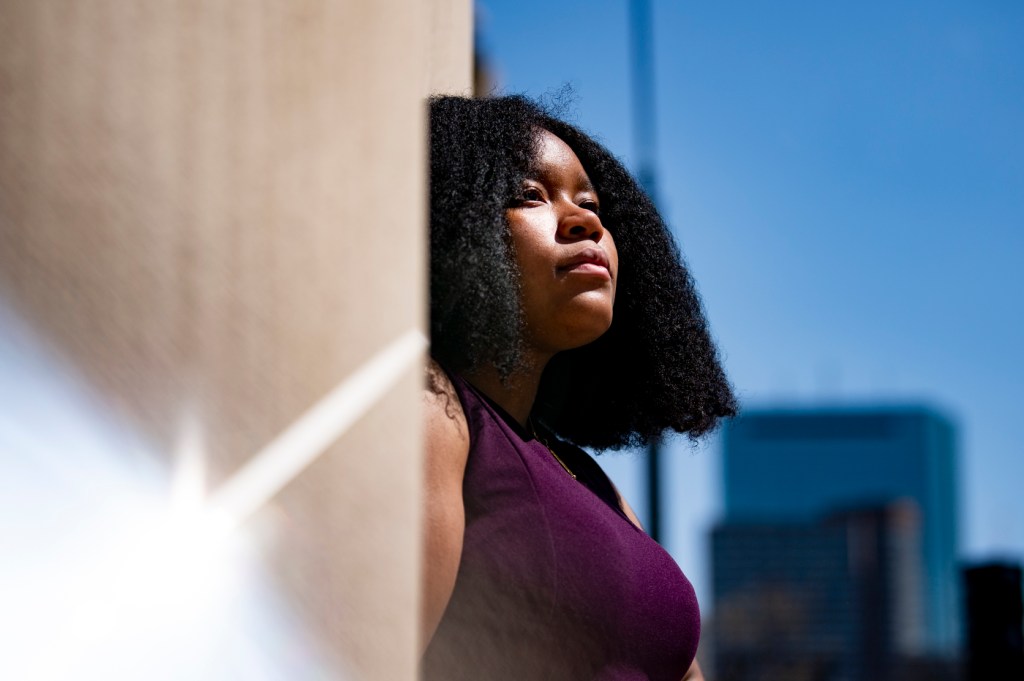Northeastern law graduate looks to support underserved communities as intellectual property attorney

This is part of our coverage of Northeastern’s 2022 Commencement exercises. For more information, including a livestream, photos, and live coverage throughout the day, visit our dedicated Commencement page.
Simone Yhap was there when Ketanji Brown Jackson, then a nominee for the U.S. Supreme Court, was fielding questions from senators during her confirmation hearing.
It was a momentous occasion for Yhap, the national chair of the National Black Law Students Association (NBLSA) and a soon-to-be Northeastern law graduate. But it was one that was marred, she says, by the line of questioning by members of the Republican Party. She was asked, for example, to provide a definition of “woman,” and faced insinuations that she was soft on crime. There was this question from Arkansas Sen. Tom Cotton: “Do you think we should catch and imprison more murderers or fewer murderers?”
“They didn’t really focus on her record,” the 24-year-old says of the senators who criticized Jackson. “They tried to cherry pick certain things, such as her rulings on, for example, child pornography cases, without realizing that what they were criticizing were the statutes and sentencing guidelines themselves. And the sentencing guidelines are created by Congress; so how are you placing blame on a judge for following the rules, when the onus is on that same body [Congress]?”

Yhap says GOP senators used Jackson’s confirmation as a way to rouse political support ahead of the midterm elections. Yhap attributes much of the deliberate “distraction and disrespect”—what she describes as the “ultra-MAGA” politics still dominating the Republican Party—to misogynoir. The term, coined by former Northeastern assistant professor Moya Bailey, describes the specific race- and gender-based biases Black women face.
“You saw that heightened scrutiny simply because she is a Black woman,” Yhap says.
Yhap was invited to attend the hearing by Massachusetts Sen. Ed Markey (all attendees were there at the invitation of lawmakers). To show her support for Jackson, she penned a letter of support on behalf of the NBLSA. It’s part of what she felt called upon to do as the public face of the student group ever since she was elected by its board of directors in December 2021. Her term as chairwoman ended in April.
Yhap says representing the NBLSA was an opportunity to push forward the work she was already doing: Advocating for more diversity across the legal profession, while pushing for increased funding and resources for students of color looking to pursue a legal education.
“I knew this was something I wanted to do in addition to the work I was already doing,” Yhap says. “I’ve been striving to bring the association to new heights.”
Yhap doesn’t shy away from calling herself an activist. In fact, she’s worked methodically to map her own activism into her educational journey. As the first chief diversity editor of the Northeastern University Law Review, she helped grow the number of Black people, indigenous people, and other people of color working on the publication. While at the helm of NBLSA, she worked to promote more gender-inclusive programming, creating events for law students who identify as non-binary. She also helped organize a “day of action” in Washington, D.C. with NBLSA’s strategic partners in anticipation of Jackson’s historic swearing in.
“Whenever I’m leading something or engaged in something, I ask, ‘How is this positively impacting the communities, not only that I’m a part of, but more importantly, that I’m serving?’” she says. “As a changemaker and an activist, it’s important to think about how we are providing awareness of these social issues, but also speaking up, showing out, and demonstrating our connection and commitment to the community and the people.”
Yhap will be taking all of that experience into the world in a few weeks’ time. She has already secured a post-graduation job as an intellectual property litigation associate at Mintz Levin—a global full-service law firm headquartered in Boston. While a niche area of law, Yhap says patent, copyright, and trademark laws are deeply rooted in racism.
She says she looks forward to “supporting Black inventors and creators,” protecting intellectual property, and helping to advance the “economic position of Black minority communities.”
“For Black and minority creators and inventors, so much of their intellectual property has historically been stolen because of racist policies,” Yhap says.
For media inquiries, please contact media@northeastern.edu.






